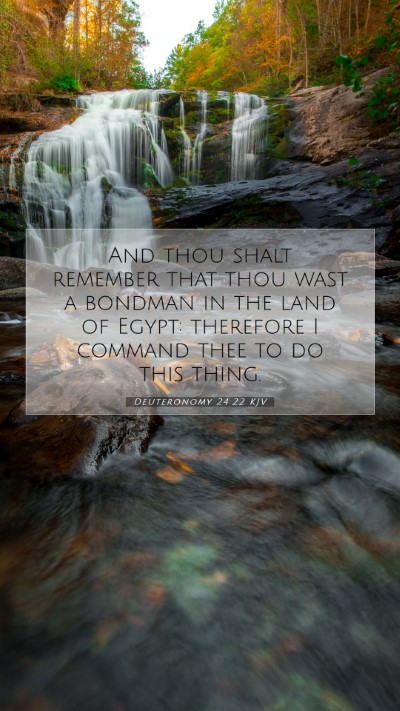Understanding Deuteronomy 24:22
Bible Verse: Deuteronomy 24:22 - "And thou shalt remember that thou wast a bondman in the land of Egypt: therefore I command thee to do this thing."
Overview
The verse emphasizes the importance of empathy and remembrance of past sufferings, particularly referencing the Israelites' time as slaves in Egypt. This remembrance should guide their actions, particularly in their dealings with the less fortunate.
Exegetical Insights
- Matthew Henry's Commentary:
Matthew Henry emphasizes the moral obligation derived from Israel's historical suffering. He argues that the command reflects a duty to care for the vulnerable and to act with compassion towards others, highlighting the ethical implications of one's past experiences.
- Albert Barnes' Notes:
Barnes remarks on the historical context of the laws given in Deuteronomy. He notes that the Israelites were called to remember their history to develop a sense of justice and mercy. The enduring lesson is to embody the sentiment of freedom as they treat others.
- Adam Clarke's Commentary:
Clarke points out that the verse serves as a reminder to remain humble and kind, rooted in the experience of Hebrew bondage. He highlights the importance of aligning one's conduct with the compassion they would have desired during their suffering.
Thematic Analysis
Memory and Compassion: The call to remember their bondages serves to cultivate compassion within the community since they were once on the receiving end of oppression.
Justice in Action: The commandment is a social justice directive, urging the Israelites to reflect their own history in their treatment of others. This cultural remembrance is foundational for creating a society that values equity.
Cross References
- Exodus 22:21: "Thou shalt not vex a stranger nor oppress him; for ye were strangers in the land of Egypt."
- Leviticus 19:34: "But the stranger that dwelleth with you shall be unto you as one born among you, and thou shalt love him as thyself."
- Deuteronomy 5:15: "And remember that thou wast a servant in the land of Egypt, and that the LORD thy God brought thee out thence."
- Proverbs 14:31: "He that oppresseth the poor reproacheth his Maker: but he that honoreth him hath mercy on the poor."
Application to Daily Life
This verse and its implications about remembering our past can be applied in various contexts:
- Empathy in Relationships: Understanding one’s past can help foster empathy towards others facing difficulties.
- Engagement in Social Justice: Individuals are encouraged to stand against oppression and advocate for those who are marginalized, reflecting on their own experiential learning.
- Benevolence in Community: As communities reflect on their histories, they can better support local and global missions aimed at justice and mercy.
Final Thoughts
This verse is a powerful reminder of the importance of remembrance and the ethical obligations that arise from historical suffering. By acknowledging our past, we can better inform our present actions and contribute to a more compassionate and just society.
Further Study Resources
If this verse has inspired your interest in deeper biblical understanding, consider exploring:
- Online Bible study tools that focus on biblical justice.
- Study groups that discuss historical context in scripture.
- Courses that offer insights into the application of Old Testament principles in modern society.
Conclusion
Deuteronomy 24:22 encapsulates the essence of biblical teachings on mercy and justice. Through careful study and contemplation of the historical and ethical implications of this verse, believers can find profound meaning and guidance in their faith journey.


